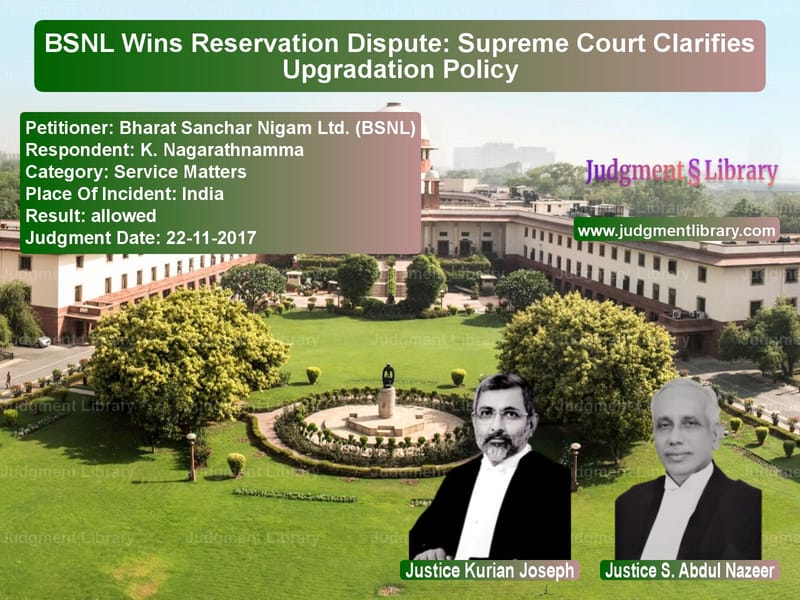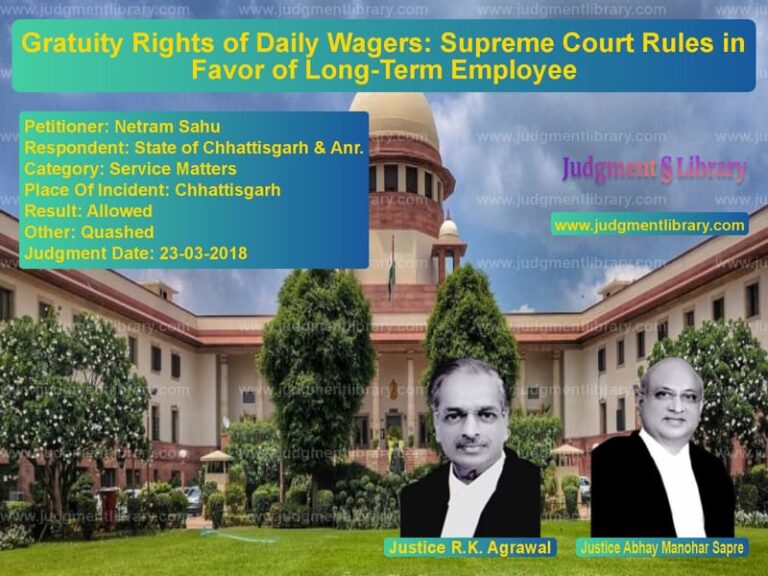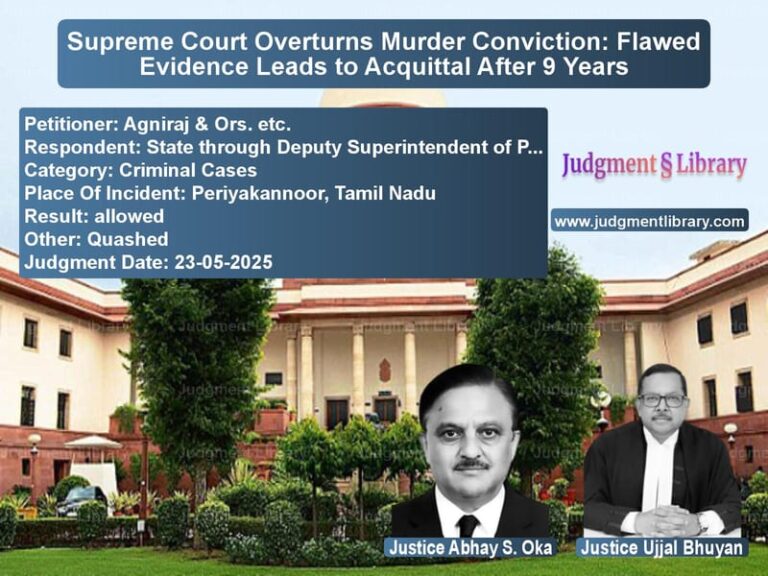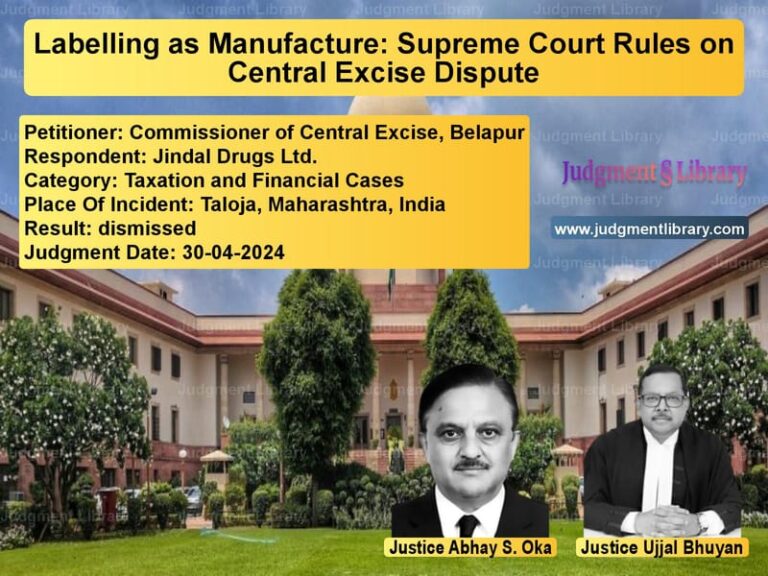BSNL Wins Reservation Dispute: Supreme Court Clarifies Upgradation Policy
The case of Bharat Sanchar Nigam Ltd. (BSNL) vs. K. Nagarathnamma revolved around the contentious issue of whether reservation policies apply to upgradation processes within public sector enterprises. The Supreme Court ruled in favor of BSNL, reaffirming its previous decision in BSNL vs. R. Santhakumar Velusamy (2011), holding that reservation benefits do not extend to mere upgradations.
Background of the Case
The case originated from a dispute regarding the upgradation of employees within BSNL, a government-owned telecom company. The respondent, K. Nagarathnamma, challenged BSNL’s decision not to extend reservation benefits in an upgradation exercise. The issue was whether reservation provisions in government employment applied to an upgradation, which BSNL argued was distinct from a promotion.
The key contentions in the case were:
- Whether upgradation of employees in a government undertaking constitutes a promotion.
- Whether reservation policies should be applied to such upgradations.
- The applicability of the Supreme Court’s ruling in BSNL vs. R. Santhakumar Velusamy to this case.
Legal Framework Governing Reservation in Promotions
The case examined the scope of reservation policies under the Indian Constitution and service regulations. The legal provisions relevant to the dispute included:
- Article 16(4) of the Constitution of India: Empowers the state to provide reservation in appointments and promotions for backward classes.
- Article 335: Mandates that reservation policies should not compromise administrative efficiency.
- DoPT Guidelines: Define the applicability of reservation in government promotions and upgradations.
Petitioner’s Arguments
BSNL, represented by senior counsel, argued that:
- Upgradation is a distinct administrative exercise and does not constitute a promotion.
- The Supreme Court had already ruled in BSNL vs. R. Santhakumar Velusamy (2011) that reservation policies do not apply to upgradations.
- Applying reservation to upgradations would set a precedent leading to administrative inefficiencies.
- The respondent’s claim was not supported by any statutory provision requiring reservation in upgradations.
Respondent’s Arguments
The respondent, K. Nagarathnamma, contended that:
- The upgradation process at BSNL was equivalent to a promotion as it involved higher responsibilities and pay scale improvements.
- Reservation benefits should be applicable to ensure equal representation of backward classes.
- The previous ruling in BSNL vs. R. Santhakumar Velusamy should not apply as the circumstances in the present case were different.
- By excluding reservation in upgradations, BSNL was effectively discriminating against employees belonging to SC/ST categories.
Supreme Court’s Observations
The Supreme Court, led by Justices Kurian Joseph and S. Abdul Nazeer, upheld BSNL’s position. The Court made the following key observations:
- Upgradation is an administrative process to adjust cadre structures and does not involve selection-based advancement.
- The ruling in BSNL vs. R. Santhakumar Velusamy (2011) was directly applicable to the case and reaffirmed the principle that reservation does not extend to upgradations.
- Providing reservation in upgradations would lead to practical difficulties and administrative inefficiencies.
- The respondent failed to establish that her exclusion from the upgradation process violated any constitutional or statutory rights.
The Court stated:
“The issue raised in this case, as to whether reservation is available in upgradation simplicitor, is covered in favor of the appellant by the decision of this Court in Bharat Sanchar Nigam Ltd. vs. R. Santhakumar Velusamy (2011) 9 SCC 510.”
Final Judgment
The Supreme Court allowed BSNL’s appeal and ruled that reservation policies do not apply to cadre upgradations. The decision reinforced that upgradations are distinct from promotions and do not attract affirmative action provisions under service rules.
Implications of the Judgment
The ruling has significant implications for public sector employment policies:
1. Clarification of Reservation Policies
The judgment clarifies that reservation benefits apply to promotions but not to upgradations, ensuring administrative consistency.
2. Administrative Efficiency
By exempting upgradations from reservation policies, the ruling prevents bureaucratic complications in cadre restructuring.
3. Precedent for Future Cases
This judgment sets a legal precedent, guiding future cases involving similar disputes over reservation in public sector employment.
4. Impact on SC/ST Employees
While the ruling upholds administrative policies, it may impact SC/ST employees seeking reservation benefits in cadre restructurings.
Conclusion
This case serves as an important precedent for government employment policies regarding reservation in promotions and upgradations. The Supreme Court’s ruling reinforces the distinction between promotions and upgradations, ensuring that reservation policies are applied appropriately while maintaining administrative efficiency.
Don’t miss out on the full details! Download the complete judgment in PDF format below and gain valuable insights instantly!
Download Judgment: Bharat Sanchar Nigam vs K. Nagarathnamma Supreme Court of India Judgment Dated 22-11-2017.pdf
Direct Downlaod Judgment: Direct downlaod this Judgment
See all petitions in Promotion Cases
See all petitions in Recruitment Policies
See all petitions in Public Sector Employees
See all petitions in Judgment by Kurian Joseph
See all petitions in Judgment by S. Abdul Nazeer
See all petitions in allowed
See all petitions in supreme court of India judgments November 2017
See all petitions in 2017 judgments
See all posts in Service Matters Category
See all allowed petitions in Service Matters Category
See all Dismissed petitions in Service Matters Category
See all partially allowed petitions in Service Matters Category







